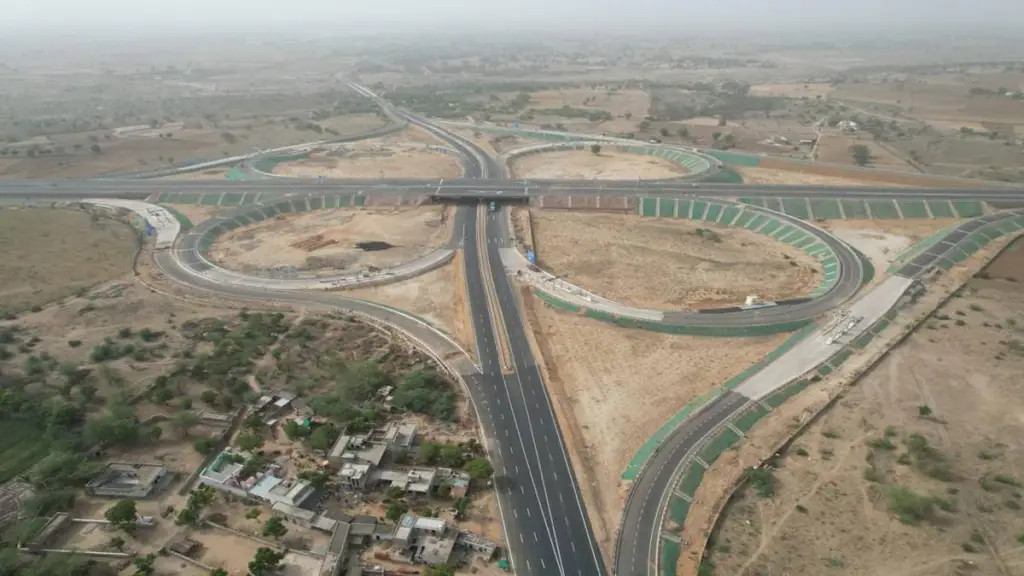The newly completed Bandikui-Jaipur Spur, a 66.9-km section of the Delhi-Mumbai Expressway, has slashed travel time between Delhi and Jaipur to 2.5–3 hours, down from 5–6 hours. Opened for a toll-free trial on July 2, 2025, this four-lane, access-controlled highway, built at a cost of ₹1,368 crore, connects Bandikui in Dausa district to Jaipur, bypassing the congested NH-48 and NH-21 routes. Here’s everything you need to know about this game-changing infrastructure project.
Key Features of the Bandikui-Jaipur Spur
- Reduced Travel Time: The spur cuts the Delhi-Jaipur journey to 2.5–3 hours, with Bandikui to Jaipur taking just 25–30 minutes compared to over an hour previously. Gurugram to Bandikui is now approximately 3 hours.
- Toll-Free Trial: The trial, which began at 8 a.m. on July 2, 2025, is toll-free for 10 days to allow for safety audits and quality checks. Toll collection will start post-trial, with proposed rates of ₹680–₹690 for the full Delhi-Jaipur trip and ₹150 for the Bandikui-Jaipur stretch.
- High-Speed Corridor: With a speed limit of 120 km/h, the expressway ensures faster, smoother travel for commuters and freight, reducing fuel and logistics costs by up to 30%.
- Strategic Connectivity: The spur links Jaipur directly to the Delhi-Vadodara-Mumbai corridor via the Delhi-Mumbai Expressway, with interchanges like Khuri (connecting to the Manoharpur-Kauthun Highway) ensuring seamless traffic flow.
- Cost and Construction: Built by the National Highways Authority of India (NHAI) in 2.5 years for ₹1,368 crore (though some sources cite ₹2,016 crore), the project was completed ahead of schedule under the Bharatmala initiative.
Why This Matters
The Bandikui-Jaipur Spur addresses longstanding bottlenecks on the Delhi-Jaipur route. Previously, commuters exited the Delhi-Mumbai Expressway at Bandhrej toll plaza in Dausa and navigated the congested Jaipur-Agra Highway (NH-44), adding 1.5–2 hours to the journey. The new spur, starting at Bagrana near Jaipur’s Ring Road and connecting to the expressway at Hilalpur, bypasses this, offering a direct, high-speed alternative.
Benefits
- Time Savings: The journey from Delhi’s DND Flyway or IGI Airport to Jaipur now takes as little as 3 hours, with one driver reporting a 3-hour-40-minute trip, including a 30-minute stop.
- Economic Impact: The spur is expected to boost tourism to Jaipur’s attractions (e.g., Amer Fort, Jantar Mantar) and stimulate economic activity in Dausa, Bandikui, and surrounding areas by improving connectivity.
- Freight Efficiency: Freight traffic could see 20–30% time savings, reducing logistics costs and emissions.
- Decongestion: The spur diverts traffic from NH-48, NH-21, and NH-44, easing wear on these older highways.
Trial Phase and Toll Details
The 10-day toll-free trial, ending around July 12, 2025, allows NHAI to conduct forensic safety audits and test facilities like interchanges at Bhedoli, Khurikurd, Sundarpura, and Geela ki Nangal. Vehicles (except tractors, motorcycles, and restricted categories) can travel uninterrupted at up to 120 km/h. Post-trial, tolls for private cars include:
- ₹150 for Bandikui-Jaipur (66.9 km)
- ₹550–₹560 for Bandikui-Sohna
- ₹130 for Sohna-Gurugram
- ₹680–₹690 for the full Delhi-Jaipur journey
NHAI’s Project Director, B.S. Joiya, confirmed that toll collection awaits final approval, with all systems ready.
Broader Context: Delhi-Mumbai Expressway
The Bandikui-Jaipur Spur is part of the 1,350-km Delhi-Mumbai Expressway, an eight-lane (expandable to 12) project connecting Delhi to Mumbai via Haryana, Rajasthan, Madhya Pradesh, Gujarat, and Maharashtra. Partially operational since February 2023, it’s set for full completion by October 2025, cutting Delhi-Mumbai travel from 24 to 12 hours. The spur enhances connectivity to cities like Jaipur, Kota, and Vadodara, with features like wildlife crossings and solar power integration.
Challenges and Considerations
- Safety Concerns: The trial phase includes a forensic audit to address potential safety issues, as the 120 km/h speed limit demands robust road design and signage.
- Wildlife Impact: Experts have raised concerns about insufficient wildlife crossings near Sariska and Ranthambore reserves, which could affect leopard habitats. Additional crossings are needed to mitigate environmental impact.
- Toll Costs: While affordable, the ₹680–₹690 Delhi-Jaipur toll may deter some commuters, though a proposed ₹3,000 annual toll pass could ease costs for frequent travelers.
Conclusion
The Bandikui-Jaipur Spur, completed ahead of schedule for ₹1,368 crore, marks a milestone in India’s infrastructure push under the Bharatmala project. By reducing Delhi-Jaipur travel to 2.5–3 hours, it promises time savings, lower logistics costs, and economic growth for Rajasthan and beyond. The toll-free trial, ending around July 12, 2025, offers commuters a chance to experience this high-speed corridor. Travelers should plan routes via Bagrana or Khuri interchanges and monitor NHAI updates for toll implementation. This spur is a step toward world-class connectivity, but addressing safety and environmental concerns will ensure its long-term success.
Disclaimer: The views expressed are for educational purposes and do not constitute travel or investment advice. Always check official NHAI sources for the latest updates.

